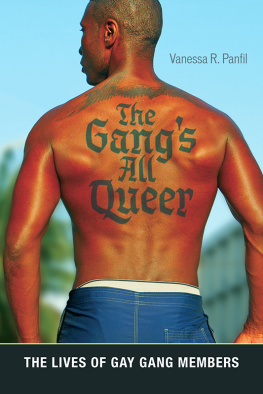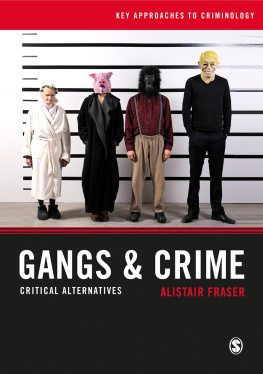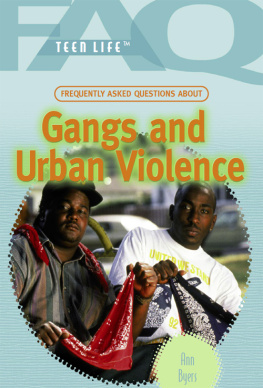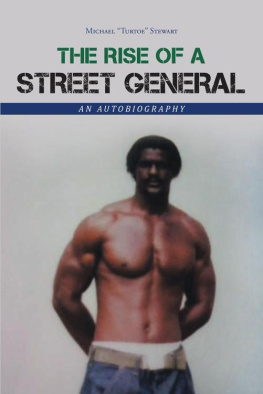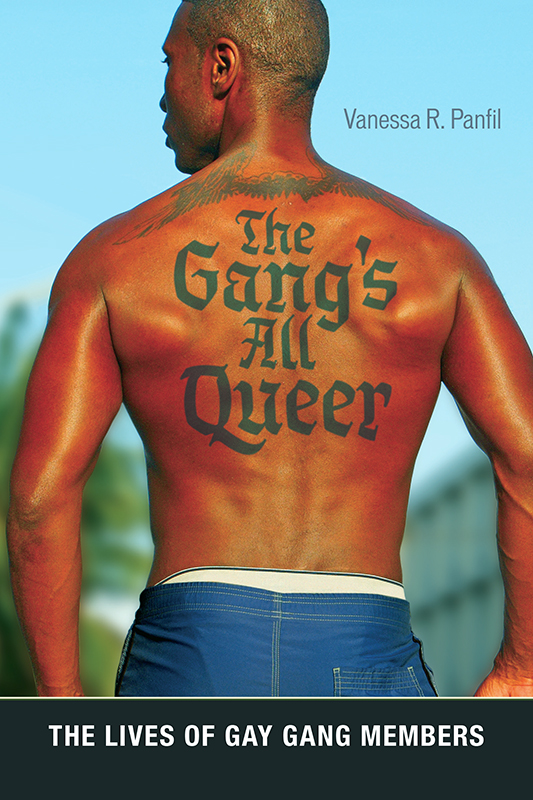
Advance Praise for The Gangs All Queer
With deep understanding and brash witVanessa Panfils own and that of the gay gang members whose voices pop from these pagesThe Gangs All Queer cuts through all sorts of false assumptions about gangs, gay men, masculinities, and sexualities. Panfils account is complex, vibrant, surprising, and moving.
Joshua Gamson, author of Modern Families: Stories of Extraordinary Journeys to Kinship
Panfils work is a well-researched new and innovative contribution to the gang literature that fills an important gap in both criminological and sociological treatments of transgression. This book deserves to be read widely and used as an antidote to the hackneyed stereotypes that still constitute much of the discourse in this sub-field.
David Brotherton, author of Youth Street Gangs: A Critical Appraisal
There is so much that is fascinating, original, and important about this book.... It rejuvenates and invigorates our thinking about masculinity and queer theory, and it is a breath of fresh air for gang scholarship. This revolutionary and honest work is sure to enliven most courses in criminology or sociology, stir surprise and debates in students, and endure in their memory for years to come.
Robert Garot, author of Who You Claim: Performing Gang Identity in School and on the Streets
Offering powerful ethnographic evidence that homosexual sex practices and queer subjectivities extend to all realms of social life, The Gangs All Queer poses a much-needed challenge to criminologists inattention to the complexities of gender and sexuality within gangs. Panfils analysis raises timely and provocative questions about the social construction of crime and the very definition of gangs themselves.
Jane Ward, author of Not Gay: Sex between Straight White Men
Alternative Criminology Series
General Editor: Jeff Ferrell
Pissing on Demand: Workplace Drug Testing and the Rise of the Detox Industry
Ken Tunnell
Empire of Scrounge: Inside the Urban Underground of Dumpster Diving, Trash Picking, and Street Scavenging
Jeff Ferrell
Prison, Inc.: A Convict Exposes Life inside a Private Prison
by K.C. Carceral, edited by Thomas J. Bernard
The Terrorist Identity: Explaining the Terrorist Threat
Michael P. Arena and Bruce A. Arrigo
Terrorism as Crime: From Oklahoma City to Al-Qaeda and Beyond
Mark S. Hamm
Our Bodies, Our Crimes: The Policing of Womens Reproduction in America
Jeanne Flavin
Graffiti Lives: Beyond the Tag in New Yorks Urban Underground
Gregory J. Snyder
Crimes of Dissent: Civil Disobedience, Criminal Justice, and the Politics of Conscience
Jarret S. Lovell
The Culture of Punishment: Prison, Society, and Spectacle
Michelle Brown
Who You Claim: Performing Gang Identity in School and on the Streets
Robert Garot
5 Grams: Crack Cocaine, Rap Music, and the War on Drugs
Dimitri A. Bogazianos
Judging Addicts: Drug Courts and Coercion in the Justice System
Rebecca Tiger
Courting Kids: Inside an Experimental Youth Court
Carla J. Barrett
The Spectacular Few: Prisoner Radicalization and the Evolving Terrorist Threat
Mark S. Hamm
Comic Book Crime: Truth, Justice, and the American Way
Nickie D. Phillips and Staci Strobl
The Securitization of Society: Crime, Risk, and Social Order
Marc Schuilenburg
Covered in Ink: Tattoos, Women, and the Politics of the Body
Beverly Yuen Thompson
Narrative Criminology: Understanding Stories of Crime
Edited by Lois Presser and Sveinung Sandberg
Progressive Punishment: Job Loss, Jail Growth and the Neoliberal Logic of Carceral Expansion
Judah Schept
Meth Wars: Police, Media, Power
Travis Linneman
Hacked: A Radical Approach to Hacker Culture and Crime
Kevin F. Steinmetz
The Gangs All Queer: The Lives of Gay Gang Members
Vanessa R. Panfil
The Gangs All Queer
The Lives of Gay Gang Members
Vanessa R. Panfil

NEW YORK UNIVERSITY PRESS
New York
NEW YORK UNIVERSITY PRESS
New York
www.nyupress.org
2017 by New York University
All rights reserved
References to Internet websites (URLs) were accurate at the time of writing. Neither the author nor New York University Press is responsible for URLs that may have expired or changed since the manuscript was prepared.
ISBN : 978-1-4798-0520-4 (hardback)
ISBN : 978-1-4798-7002-8 (paperback)
For Library of Congress Cataloging-in-Publication data, please contact the Library of Congress.
New York University Press books are printed on acid-free paper, and their binding materials are chosen for strength and durability. We strive to use environmentally responsible suppliers and materials to the greatest extent possible in publishing our books.
Manufactured in the United States of America
10 9 8 7 6 5 4 3 2 1
Also available as an ebook
For the victims and survivors of the Pulse Orlando shooting,
and everyone who dares to live out loud.
Contents
Data collection for this study was supported in part by two financial awards from the University at Albanys Initiatives for Women, specifically the Karen R. Hitchcock New Frontiers Fund. This book was completed because I received support from the School of Criminal Justice at the University at Albany, the School of Criminal Justice at Rutgers University-Newark, and the Department of Sociology and Criminal Justice at Old Dominion University. I especially thank my colleagues and the doctoral students at ODU for their encouragement as I revised and finished this book. Cheers also go to the professional development/writing groups Ive been a part of: Academic Pursuit at UAlbany and the J-Team at Rutgers.
I have been fortunate to have stellar mentorship. Jody Miller deserves much praise for reading many drafts (probably too many to count) of this manuscript, providing valuable comments, and helping me find my voice as a queer and feminist scholar. I am always in awe of Jodys critical and constructive eye. Dana Peterson advocated for me as I conducted this research and writing, and had faith in my ability to complete this project even when my own was wavering. I am inspired by her onward and upward spirit. Jamie Fader was influential in the design of my study and instrument, and helped me problem-solve often. Frankie Bailey helped me think through popular culture and historical representations.
I also consider myself very lucky to be part of a vibrant community of queer criminology scholars committed to social change. I am particularly appreciative for my dear friends Allyson Walker, Aimee Wodda, and Jordan Blair Woods, who read drafts and talked through difficult decisions with me. They have been excellent compasses in my scholarship and my life, and I treasure them. For needed breaks from or tireless encouragement for book writing, I thank my good friends Heidi Grundetjern, Chris Smith, Rose Bellandi, Raquel Derrick, Amy Hayter, Michelle Hand-Lang, Alison Reed, Elizabeth Groeneveld, Topher Lawton, and Seigo Nishijima. It is truly a gift to be surrounded by positive, caring people.
In Columbus, my siblings, nieces, and nephews always warmly welcomed me home. They bring me so much joy! I miss them daily. I am especially grateful to my parents, Peter and Rachel Panfil, for being infinitely supportive of my queer activism and scholarship. I am beyond thrilled when they talk about my work with such pride.
Next page

